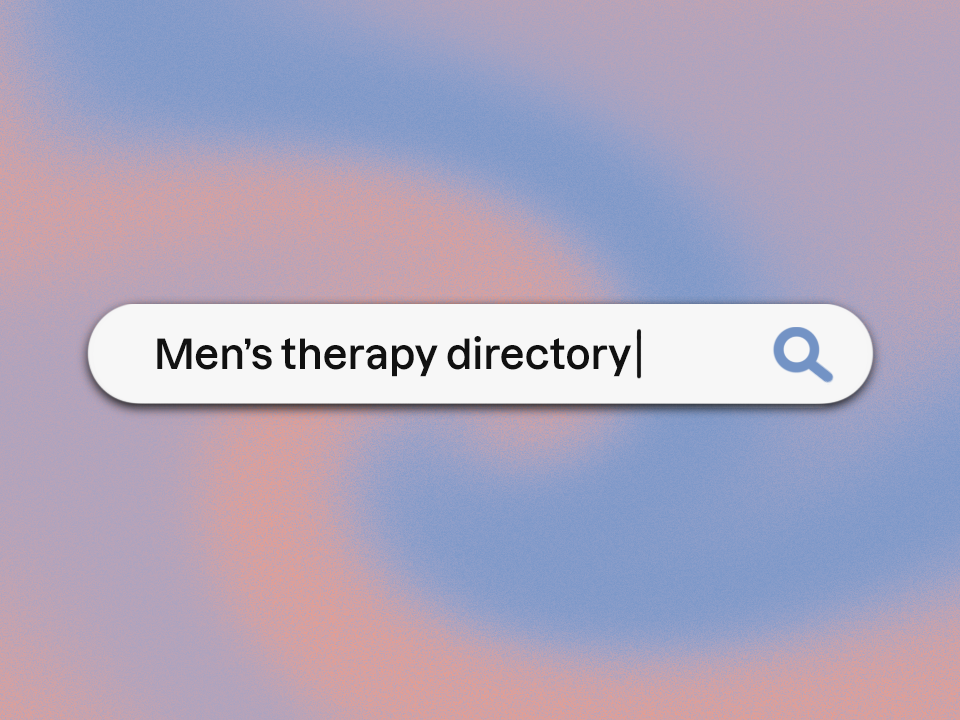11 Guys Who Went to Therapy Report Back
“It was nice to have a place to go where I’m not judged.”
It’s probably safe to say that right now more folks are open to mental health help than ever before (or at least since 2019, according to a report from the Centers for Disease Control and Prevention). Yet, statistically, men are still skeptical: Per that same CDC report, only 17.8% of men between the ages of 18 and 44 got mental health help in 2021 compared to 28.6% of women the same age.
And there are probably a ton of reasons for that, most notably a big thing called stigma. It can live rent-free in your mind, making you wonder whether talking about your feelings means you're soft or that you have a deficiency of some sort. But, truth is, utilizing resources like therapy shows strength and a willingness to grow—and that can make a HUGE difference in how you feel about your life.
I initially dipped my toes into therapy when I was in my early 20s, prompted by my (extremely unhelpful) talent for spiraling about worst-case scenarios. I used to drink to ease my nerves—an easy, temporary solve for a complicated emotional issue. But it wasn’t until I went to therapy that I discovered what was really going on in my mind: anxiety.
My first therapist worked at the local college that offered sliding-scale counseling. At first, I didn’t even know what I wanted to get out of therapy; I just knew everything in life felt wrong. I was terrified of exposing my inner thoughts to a stranger, but I was desperate to quiet the ones that made me nearly incapable of speaking some days. Taking that first step into therapy was the beginning of learning how to cope with all my anxious thoughts. By 25, I was sober. Today? My ability to accept an assist is helping me thrive.
If you’re debating making that first appointment or wondering if you’d even benefit from it, here's why 10 other men started therapy, what they learned from their therapists, and why they went back.
1. I didn’t know how to talk about what I was feeling.
“I was 19 years old and really struggling with depression, loneliness, and suicidal ideation. I never felt a stigma around therapy; members of my family had been to therapy. Going to therapy gave me some of the language [I needed to] come to terms with what I was dealing with. My therapist helped me look back at my life and see where patterns were coming from. I feel like our generation and younger is like, ‘Guess what I learned in therapy yesterday?' It's just like when you're physically ill or need a checkup, you go to the doctor. When you need emotional or psychological support, you go to a therapist. That’s all there is to it. Therapy has been so helpful that I've continued going on and off over the years.” —Jeff D., 35
2. I knew I needed to get ahead of my mental health.
“When I got into therapy, I was going through my doctoral program, trying to juggle working full time during the pandemic and going through a breakup. That prompted me to be proactive about my mental health. At first, I went in with hopes of fixing things within the relationship, but the other person didn’t [want to go to] therapy, so that sent me on a solo mission, which was a blessing [because I could focus on myself].
Part of the journey is changing your mindset and just being open and wanting to heal. Although I did know that a stigma is there, I looked at it like physical therapy, more so focusing on the benefits to my mental health rather than the negatives. One thing my therapist [taught me] is to focus on the next 24 hours. You can get overwhelmed trying to focus on where you should be a year from now, a month from now, or a week from now, but if you focus on winning the day every single day, then that'll help you.” —Daiquan P., 31
3. I needed a safe place to vent.
“When I was in the military, I got married and had kids with someone who cheated on me every time I was deployed. All I ever wanted was a family. So when my home fell apart, it felt like everyone judged me for marrying this person. I went to therapy because I had to tell my story. It was nice to have a place to go where I’m not judged and to get [insight] from a therapist since I really don’t have anyone else.” —Ben G., 42
4. I needed direction.
“I first tried a counseling center in college. I don’t even remember why I went, just that a friend suggested it. I spoke with one of their random interns two times, and it was useless. I did not go back to therapy for a long time. [Then I] tried some person in my 20s because I needed career direction after getting a teaching degree and realizing I had no interest in teaching. [At the time, it felt like] talk therapy was not ideal because I talked circles around people. I only started attending therapy regularly five years ago because I was going through something that was kinda early midlife crisis-ish. Luckily, I found a new therapist who could keep up. He’s a New Yorker. I called him in crisis a few months ago, and he was able to reflect back to me, ‘You have done this before. You have this skill, and you can handle this.’ I remember feeling that this is what therapy is for, to have somebody who has an objective, caring, but detached perspective.” —John C.*, 36
5. I couldn’t avoid my anxiety anymore.
“I spent most of my life trying not to dwell too much on my childhood. I always excused what I’d been through because many had worse childhoods. I never wanted people to feel bad for me, especially those that raised me because they did the best they could with the hand they were dealt. Still, the truth is, I was sexually, physically, and emotionally abused by different people throughout my childhood and early teens. Of course I was angry that it happened and more so that it was allowed to happen.
I needed to talk to somebody, but somehow I managed to get by my whole life [without seeking help]. But, a few years ago, my father-in-law passed away and within a month I was held up at gunpoint and robbed. Something was set off within me. … All of my anxieties just came rushing through.
That’s what started [my therapy journey]. I went to one therapist who was a woman, and I opened up to her about past trauma in my life. The next therapist was a man, and I opened up to him about how those traumas might be exhibiting themselves today. They offered me different things and were both great experiences.” —Kenneth J., 37
6. I was having relationship issues.
“Being dragged to a therapist when I was a teen was weird. Torture, even, because I never understood why I was going and didn't want to be there. It [felt like] just some weird guy forcing me to sit in a chair, and he kept asking me questions. Luckily [later in life], I found a psychologist who definitely vibed with me. I started going to this psychologist for relationship issues after my (now-ex) girlfriend suggested it. We were having relationship issues, and she wanted me to take care of my mental health. … It's crazy how even saying things out loud to a therapist can make you realize how shitty things are. He was very good at making me assess my self-worth, my personal boundaries, and why I cave so often in relationship discussions and arguments. Personal boundaries are something I never would have considered before that.” —Jim M., 37
7. I knew I needed extra help.
“I thought I was strong enough to deal with my own problems and resolve them. The problem, of course, was that my problems were spilling onto other people's laps. My wife basically told me I needed therapy or our marriage probably wasn’t going to last. I would fly off the handle dumb quick if I felt like somebody was being disrespectful. It took years of therapy to understand the notion of pausing before acting. It’s something I still wrestle with.
The most valuable thing I've learned is that there are ways to deal with my particular brand of dysfunction and ways to get better that other people have tried and worked.” —Adam W., 46
8. I needed to get to the root of my struggles.
“I was required to go to therapy as a kid because of problems in school. I felt shame about seeing a therapist, mainly because going to therapy seemed different from what other kids did. When I got older, I found healing. Soon after I got sober from alcohol in my mid-20s, I found a new therapist who helped me look at things that happened in my life. I realized I was molested as a kid and repressed it. I was estranged from my family at the time, and my therapist told me I should invite my parents to come to therapy. We talked about my blaming them, and I was able to forgive them because I realized it wasn't their fault.” —Jeff A., 46
9. I needed someone who could talk me through tough times.
“I was a teenager when I first went into therapy because I was having thoughts of self-harm. High school was a really challenging time for me…and I was picked on. I had a really good therapist who talked me through things. He would say that what you're going through right now isn’t going to be forever.
That has stuck with me, and I tie that into my stay-at-home parenting outlook today. These days, [my kids keep me so busy that] I literally have to schedule bathroom breaks when I have to go. But as my kids get older, I will have more time to myself. The rough spots that I go through right now will not be forever. Although I’m not currently in individual therapy, I attend a parent support group every week. They show me I’m not alone.” —Timothy T., 49
10. I had no other options.
“For me, therapy started with the onset of a brain injury. After I got into a car accident, it became apparent that there were underlying issues, like addictions and self-medicating as a method to treat bipolar disorder and depression. I was the first one in my family to have this kind of diagnosis and get help for it, so I received a lot of shaming because [they felt there was] something different about me.
When I finally got treatment, I had no other option. It was probably the best thing that happened to me because I gained control of my life and saw the benefits of mapping my symptoms. I became more in touch with my feelings, realizing I can develop an identity and relate to people and have social relationships and friends when I used to push people away or feel isolated and cut off. I can see my part in the greater mosaic of the world than I grew up thinking was possible coming from an immigrant and first-generation [American] family.” —Tony L., 45
*Name has been changed.
Quotes have been edited and condensed for length and clarity.
Wondermind does not provide medical advice, diagnosis, or treatment. Any information published on this website or by this brand is not intended as a replacement for medical advice. Always consult a qualified health or mental health professional with any questions or concerns about your mental health.




